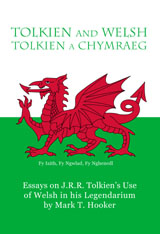
Invited to enter the 2013 Competition for the Literature Wales Book of the Year Award.  |
Tolkien and Welsh (Tolkien a Chymraeg) is a collection of articles on J.R.R. Tolkien's use of Welsh language and culture by Mark T. Hooker. It supplements, rather than competes with, the excellent Tolkien and Wales by Carl Phelpstead. “I find the Welsh language specially attractive.” Tolkien and Welsh looks for the Welsh linguistic and literary sources behind Tolkien’s Legendarium. There are Welsh etymologies for the names Boffin, Took, Maggot, and Goldberry. The most famous rivers of Middle-earth—the Anduin and Baranduin—are traced to The Mabinogion, as are some thematic elements in The Hobbit, featuring a cameo appearance by Sir Cynon. The earlier form of the Elvish name of The Lonely Mountain (Dôlereb) finds a linguistic resonance in the names of Royal Welsh castles and Greek mythology. The familial relationships of the Hobbit ring-bearers are expressed in terms of matrilineal descent, which is a characteristic of Welsh families. The classifications “Q-Elvish” and “P-Elvish,” are introduced to aid in the analysis of Sindarin, which was based on the “P-Celtic” Welsh. Quenya, however, is “Q-Elvish,” and shares some linguistic traits with “Q-Celtic” Irish. The enigma of the lenition of ‘S’ to ‘H’ in Sindarin, but not in Welsh, is resolved. What makes this book different from other books about Tolkien is that its author is a linguist who shares Tolkien’s appreciation of the histories of words and names, and who plays at the same kind of linguistic invention himself. It is a linguistic perspective that begins with a name or a word, and looks for its story in the real world with which Tolkien was familiar. This volume applies a semantic analysis to Tolkien’s invented nomenclature, comparing it with the Celtic languages, but in particular with Welsh, to determine the likely first-world history and context of the Celtic roots that Tolkien used. Linguistic invention is a product of the mind, and is, therefore, not governed by the fixed and immutable rules of the sciences. As Albert Einstein once said: Imagination is greater than knowledge. Pagination: xxx + 274, new B&W illustrations by James Dunning, maps, Index, Trade Paper $14.95. Library of Congress Cataloging Data: |
To learn more about the book, follow the links below.
